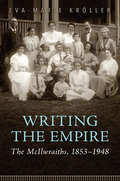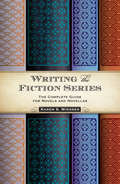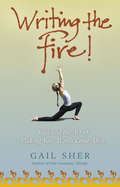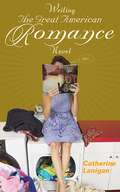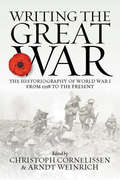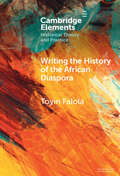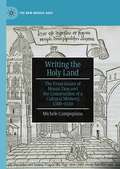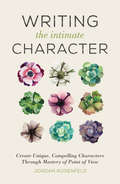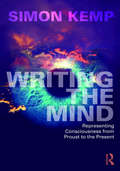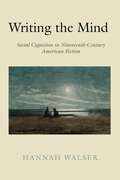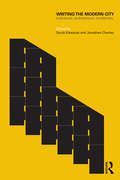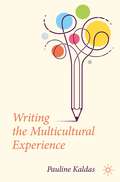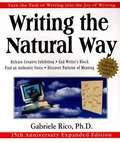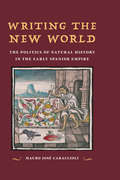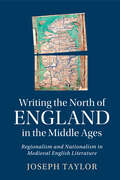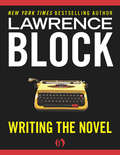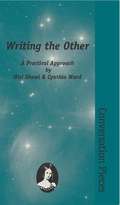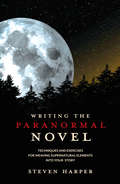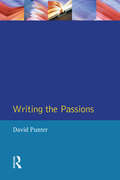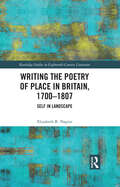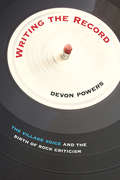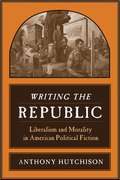- Table View
- List View
Writing the Empire: The McIlwraiths, 1853–1948
by Eva-Marie KröllerWriting the Empire is a collective biography of the McIlwraiths, a family of politicians, entrepreneurs, businesspeople, scientists, and scholars. Known for their contributions to literature, politics, and anthropology, the McIlwraiths originated in Ayrshire, Scotland, and spread across the British Empire, specifically North America and Australia, from the mid-nineteenth century onwards. Focusing on imperial networking, Writing the Empire reflects on three generations of the McIlwraiths’ life writing, including correspondence, diaries, memoirs, and estate papers, along with published works by members of the family. By moving from generation to generation, but also from one stage of a person’s life to the next, the author investigates how various McIlwraiths, both men and women, articulated their identity as subjects of the British Empire over time. Eva-Marie Kröller identifies parallel and competing forms of communication that involved major public figures beyond the family’s immediate circle, and explores the challenges issued by Indigenous people to imperial ideologies. Drawing from private papers and public archives, Writing the Empire is an illuminating biography that will appeal to readers interested in the links between life writing and imperial history.
Writing the Fiction Series: The Complete Guide for Novels and Novellas
by Karen S. WiesnerWhat are the common pitfalls in a crafting a series, the best ways to get organized and plan it? The purpose of Writing the Fiction Series is to cover all things that need to be taken into consideration when writing a series and provide a one-stop resource for the who, what, where, when and why of this monumental endeavor. This helpful guide will give writers everything they need for creating their fiction series from dealing with story arcs and keeping things focused to characters, consistency, organization and more.
Writing the Fire! Yoga and the Art of Making Your Words Come Alive
by Gail SherWriting the Fire! offers writers a new and visionary practice: using yoga to release the body's inner intelligence and then support, shape, and inform the creative process. Indeed, "writing is yoga," declares Gail Sher, introducing the "writing asana"--an invaluable new tool for every writer's routine. Her insightful and lyrical book, organized around eight thematic "immersions," plumbs yoga's wisdom heritage. As Donald Moyer, director of the Yoga Room in Berkeley, comments, "She encourages writers to approach their writing with the clarity and presence of yogis, and teaches yogis how to temper their awareness with the heat of words and images." Writing the Fire! celebrates the fullest expression of our being.
Writing the Great American Romance Novel
by Catherine LaniganThe complete guide to turning romances into cash. Romance novels are the top-selling genre in fiction. How can aspiring writers break into this lucrative field? With Writing the Great American Romance Novel, the most complete guide to writing that novel, getting it published, working with editors, agents, and publicists, and promoting it once it's out! Step-by-step instruction shows how to create romantic heroes and heroines, structure a story, and write love scenes, as well as how to plan outlines, use timelines and grids, conduct personal interviews, and do historical research. With extras such as a list of publishers, a sample press release, a sample synopsis, and much more, this book is must-have for any aspiring romance writer passionate about writing. Romance accounts for $1.2 billion in sales and 55 percent of the paperback market The group Romance Writers of America has almost 10,000 members Takes writers beyond writing to selling and promotion
Writing the Great War: The Historiography of World War I from 1918 to the Present
by Christoph Cornelissen and Arndt WeinrichFrom the Treaty of Versailles to the 2018 centenary and beyond, the history of the First World War has been continually written and rewritten, studied and contested, producing a rich historiography shaped by the social and cultural circumstances of its creation. Writing the Great War provides a groundbreaking survey of this vast body of work, assembling contributions on a variety of national and regional historiographies from some of the most prominent scholars in the field. By analyzing perceptions of the war in contexts ranging from Nazi Germany to India’s struggle for independence, this is an illuminating collective study of the complex interplay of memory and history.
Writing the History of the African Diaspora (Elements in Historical Theory and Practice)
by null Toyin FalolaThis Element is an analysis of the African Diaspora. It will define the African Diaspora and how the concepts behind the term came to be socially and historically engineered. The African diaspora is then placed into a broader historical context where the diverse, global, and overlapping histories of Africa's ancient-ongoing diasporas will be explored. In particular, themes of injustice, agency, resistance, and diversity (regarding people, diasporas, and experiences) will feature heavily. Through this exploration, this Element will interrogate dominating narratives regarding African diaspora-related discourse, seeking to address prevailing ideas that inadequately capture the true complexity and nuance of the subject. It does so to construct a more comprehensive understanding of the subject matter while lining out a more holistic approach to thinking about the very nature of 'diaspora.' Finally, this Element will analyze the present circumstances of the African diaspora, bringing into conversation a progressively global and connected world.
Writing the History of the British Stage, 1660–1900
by Richard SchochThis is the first book on British theatre historiography. It traces the practice of theatre history from its origins in the Restoration to its emergence as an academic discipline in the early twentieth century. In this compelling revisionist study, Richard Schoch reclaims the deep history of British theatre history, valorizing the usually overlooked scholarship undertaken by antiquarians, booksellers, bibliographers, journalists and theatrical insiders, none of whom considered themselves to be professional historians. Drawing together deep archival research, close readings of historical texts from the seventeenth, eighteenth and nineteenth centuries, and an awareness of contemporary debates about disciplinary practice, Schoch overturns received interpretations of British theatre historiography and shows that the practice - and the diverse practitioners - of theatre history were far more complicated and far more sophisticated than we had realised. His book is a landmark contribution to how theatre historians today can understand their own history.
Writing the Holy Land: The Franciscans of Mount Zion and the Construction of a Cultural Memory, 1300–1550 (The New Middle Ages)
by Michele CampopianoThe book shows how the Franciscans in Jerusalem in the fourteenth to sixteenth centuries wrote works which standardized the cultural memory of the Holy Land. The experience of the late medieval Holy Land was deeply connected to the presence of the Franciscans of the Convent of Mount Zion in Jerusalem, who welcomed and guided pilgrims. This book analyses this construction of a shared memory based on the continuous availability of these texts in the Franciscan library of Mount Zion, where they were copied and adapted to respond to new historical contexts. This book shows how the Franciscans developed a representation of the Holy Land by elaborating on its history and describing its religious groups and the geography of the region. This representation circulated among pilgrims and influenced how contemporaries imagined the Holy Land
Writing the Intimate Character: Create Unique, Compelling Characters Through Mastery of Point of View
by Jordan RosenfeldCraft Vibrant Characters and an Intimate Reading Experience The key to excellent fiction lies in its characters: the unforgettable protagonists, antagonists, and secondary characters who populate the world of your story. Understanding and effectively using point of view allows you to write a powerful narrative that draws readers in and engages them with characters in a meaningful way. Through a blend of practical instruction, useful examples, and helpful exercises, Writing the Intimate Character shows you how to create the experience of living through a character rather than just reading about one. Inside, you'll learn:The functions and benefits of first-person, third-person intimate, omniscient, and second-person points of view.How to apply character cues--specific behaviors, sensory perceptions, dialogue, and visual imagery--to develop a realistic protagonist and secondary cast.The surface and subset feelings that get to the root of your character’s emotions.How different viewpoints affect the story you want to tell.Writing the Intimate Character helps you craft a novel in which readers can experience your characters' senses, dive inside their minds, and truly feel their emotions. "Writing the Intimate Character, the latest engaging guide by Jordan Rosenfeld, is a rich resource we'll all be learning from for the rest of our lives. 'Does the term point of view seem too dull and dry?' she asks. 'Try intimacy instead.' And then she shows us how, with diverse examples and wise observation. Now that I have Jordan's take on how to create a character from the inside out, I'm eager to get to it. You, too, will find this book that inspiring." --Rebecca Lawton, author of Sacrament: Homage to a River and other books "Writing the Intimate Character provides insights, examples, and exercises that will be useful not only to those who are new to writing fiction but to those, like myself, who are coming back to it after a break. Jordan Rosenfeld's explanation of how narrative voice works with point of view and other literary elements to create characters that readers care deeply about is clear and revelatory. The book can be worked through methodically or dipped into as needed. It's a useful tool for getting the gears of imagination working or for jump-starting and fine-tuning a work in process." --Zoe Zolbrod, author of the novel Currency and the memoir The Telling "Jordan Rosenfeld has a keen insight into how to construct characters who are truly lived-in. With intelligence and wit, she walks you through every element of powerful characterization, from selecting your POV to demonstrating character growth throughout your story. Whether you're new to fiction or a more experienced writer, put your trust in Jordan Rosenfeld; she'll help you tell a better story." --Laura Bogart, freelance writer and novelist
Writing the Mind: Representing Consciousness from Proust to the Present
by Simon Kemp"My thought is me: that is why I cannot stop. I exist because I think… and I can’t stop myself from thinking." – Jean-Paul Sartre, Nausea Writing the Mind: Representing Consciousness from Proust to Darrieussecq explores the works of seven ground-breaking thinkers and novelists of recent history to compare and contrast the varying representations of the conscious and the unconscious mind. Grounding his study in the writings of philosophers like Jean-Paul Sartre and Marcel Proust, Simon Kemp explores the non-literary influences of science, faith and philosophy as presented in their works, demonstrates how writers learn from and sometimes deviate from preceding generations, and how they agree or disagree with their peers. Kemp’s elegant study also charts the rise and wane of Freudian influence on literature through the twentieth century, and the emergence of cognitive and neo-Darwinian ideas at the dawn of the twenty-first. In the work of these seven writers, we discover radically different understandings of how consciousness and the unconscious mind are constituted, which are the most salient characteristics of mental life, and even what it is that defines a mind at all.
Writing the Mind: Social Cognition in Nineteenth-Century American Fiction
by Hannah WalserNovels are often said to help us understand how others think—especially when those others are profoundly different from us. When interpreting a character's behavior, readers are believed to make use of "Theory of Mind," the general human capacity to attribute mental states to other people. In many well-known nineteenth-century American novels, however, characters behave in ways that are opaque to readers, other characters, and even themselves, undermining efforts to explain their actions in terms of mental states like beliefs and intentions. Writing the Mind dives into these unintelligible moments to map the weaknesses of Theory of Mind and explore alternative frameworks for interpreting behavior. Through readings of authors such as Charles Brockden Brown, Herman Melville, Martin Delany, Harriet Beecher Stowe, Charles Chesnutt, and Mark Twain, Hannah Walser explains how experimental models of cognition lead to some of the strangest formal features of canonical American texts. These authors' attempts to found social life on something other than mental states not only invite us to revise our assumptions about the centrality of mind reading and empathy to the novel as a form; they can also help us understand more contemporary concepts in social cognition, including gaslighting and learned helplessness, with more conceptual rigor and historical depth.
Writing the Modern City: Literature, Architecture, Modernity
by Sarah Edwards Jonathan CharleyLiterary texts and buildings have always represented space, narrated cultural and political values, and functioned as sites of personal and collective identity. In the twentieth century, new forms of narrative have represented cultural modernity, political idealism and architectural innovation. Writing the Modern City explores the diverse and fascinating relationships between literature, architecture and modernity and considers how they have shaped the world today. This collection of thirteen original essays examines the ways in which literature and architecture have shaped a range of recognisably ‘modern’ identities. It focuses on the cultural connections between prose narratives – the novel, short stories, autobiography, crime and science fiction – and a range of urban environments, from the city apartment and river to the colonial house and the utopian city. It explores how the themes of memory, nation and identity have been represented in both literary and architectural works in the aftermath of early twentieth-century conflict; how the cultural movements of modernism and postmodernism have affected notions of canonicity and genre in the creation of books and buildings; and how and why literary and architectural narratives are influenced by each other’s formal properties and styles. The book breaks new ground in its exclusive focus on modern narrative and urban space. The essays examine texts and spaces that have both unsettled traditional definitions of literature and architecture and reflected and shaped modern identities: sexual, domestic, professional and national. It is essential reading for students and researchers of literature, cultural studies, cultural geography, art history and architectural history.
Writing the Monarch in Jacobean England
by Jane RickardKing James VI and I's extensive publications and the responses they met played a key role in the literary culture of Jacobean England. This book is the first sustained study of how James's subjects commented upon, appropriated and reworked these royal writings. Jane Rickard highlights the vitality of such responses across genres - including poetry, court masque, sermon, polemic and drama - and in the different media of performance, manuscript and print. The book focuses in particular on Jonson, Donne and Shakespeare, arguing that these major authors responded in illuminatingly contrasting ways to James's claims as an author-king, made especially creative uses of the opportunities that his publications afforded and helped to inspire some of what the King in turn wrote. Their literary responses reveal that royal writing enabled a significant reimagining of the relationship between ruler and ruled. This volume will interest researchers and advanced students of Renaissance literature and history.
Writing the Multicultural Experience
by Pauline KaldasThis textbook takes a new approach to teaching creative writing that centers the concerns of multicultural students. It focuses on the experiences of those who wish to write through their diverse identities, including ethnic, cultural, racial, national, regional, and international identity as well as gender identity, sexual preference, class position, and disability. Combining the study of culturally diverse literature with the process of writing, students are encouraged to engage with various texts and to use them to inspire their own work. Organized around a series of writing prompts and discussions of literary readings that address identity, place, perception, family, community, encounters, inheritance, and resistance, this book offers both writers and teachers a way to engage with the practice of writing from a multicultural perspective.
Writing the Natural Way: Using Right-Brain Techniques to Release Your Expressive Powers
by Gabriele RicoCompletely revised, newly illustrated, and with a wealth of updated, field-tested exercises, this popular classic will help unlock natural writing styles and storytelling abilities.
Writing the New World: The Politics of Natural History in the Early Spanish Empire
by Mauro José CaraccioliIn Writing the New World, Mauro Caraccioli examines the natural history writings of early Spanish missionaries, using these texts to argue that colonial Latin America was fundamental in the development of modern political thought. Revealing their narrative context, religious ideals, and political implications, Caraccioli shows how these sixteenth-century works promoted a distinct genre of philosophical wonder in service of an emerging colonial social order.Caraccioli discusses narrative techniques employed by well-known figures such as Gonzalo Fernández de Oviedo and Bartolomé de Las Casas as well as less-studied authors including Bernardino de Sahagún, Francisco Hernández, and José de Acosta. More than mere catalogues of the natural wonders of the New World, these writings advocate mining and molding untapped landscapes, detailing the possibilities for extracting not just resources from the land but also new moral values from indigenous communities. Analyzing the intersections between politics, science, and faith that surface in these accounts, Caraccioli shows how the portrayal of nature served the ends of imperial domination.Integrating the fields of political theory, environmental history, Latin American literature, and religious studies, this book showcases Spain’s role in the intellectual formation of modernity and Latin America’s place as the crucible for the Scientific Revolution. Its insights are also relevant to debates about the interplay between politics and environmental studies in the Global South today. This book is freely available in an open access edition thanks to TOME (Toward an Open Monograph Ecosystem)—a collaboration of the Association of American Universities, the Association of University Presses, and the Association of Research Libraries—and the generous support of Virginia Tech.
Writing the North of England in the Middle Ages: Regionalism and Nationalism in Medieval English Literature (Cambridge Studies in Medieval Literature #119)
by Joseph TaylorWriting the North of England in the Middle Ages offers a literary history of the North-South divide, examining the complexities of the relationship – imaginative, material, and political – between North and South in a wide range of texts. Through sustained analysis of the North-South divide as it emerges in the literature of medieval England, this study illustrates the convoluted dynamic of desire and derision of the North by the rest of country. Joseph Taylor dissects England's problematic sense of nationhood as one which must be negotiated and renegotiated from within, rather than beyond, national borders. Providing fresh readings of texts such as Chaucer's Canterbury Tales, the fifteenth-century Robin Hood ballads and the Towneley plays, this book argues for the North's vital contribution to processes of imagining nation in the Middle Ages and shows that that regionalism is both contained within and constitutive of its apparent opposite, nationalism.
Writing the Novel
by Lawrence BlockWriting lessons from the crown prince of suspenseFor more than five decades, Lawrence Block has written novels. He has produced hard-boiled detective stories, taut suspense thrillers, literature, and erotica, and has succeeded in all these genres because he knows how to grab a reader with an opening line, and how to tighten that grip until the final sentence.In Writing the Novel: From Plot to Print, Block offers neither tricks nor formulas, but straightforward advice based on the experience that comes with producing more than one hundred books. He explains how to refine an idea, how to study one's chosen genre, and how to use the novel's expansive form to find one's particular voice. And he tells it all in the easy, immediate style that has made his own work so successful.This ebook features an illustrated biography of Lawrence Block, including rare photos and never-before-seen documents from his personal collection, and a new afterword written by the author.
Writing the Other: A Practical Approach (Volume 8 in the Conversation Pieces Series)
by Nisi Shawl Cynthia WardMany writers avoid creating characters of different ethnic backgrounds than their own, out of fear that they might get it wrong. To address this fear, Nisi Shawl and Cynthia Ward collaborated to develop a workshop that addresses these problems with the aim of both increasing writers' skill and sensitivity in portraying difference in their fiction as well as allaying their anxieties about "getting it wrong." Writing the Other: A Practical Approach is the manual that grew out of their workshop. It discusses basic aspects of characterization and offers elementary techniques, practical exercises, and examples for helping writers create richer and more accurate characters with "differences."
Writing the Paranormal Novel: Techniques and Exercises for Weaving Supernatural Elements into Your Story
by Steven HarperVampires, werewolves, and zombies, oh my!Writing a paranormal novel takes more than casting an alluring vampire or arming your hero with a magic wand. It takes an original idea, believable characters, a compelling plot, and surprising twists, not to mention great writing. This helpful guide gives you everything you need to successfully introduce supernatural elements into any story without shattering the believability of your fictional world or falling victim to common cliches. You'll learn how to:Choose supernatural elements and decide what impact the supernatural will have on your fictional worldCreate engaging and relatable characters from supernatural protagonists and antagonists to supporting players (both human and non-human)Develop strong plots and complementary subplotsWrite believable fight scenes and flashbacksCreate realistic dialogueAnd much moreComplete with tips for researching your novel and strategies for getting published, Writing the Paranormal Novel gives you everything you need to craft a novel where even the most unusual twist is not only possible-it's believable.
Writing the Passions
by David PunterWriting the Passions is a book of literary criticism, of philosophy and of the politics of modernity. It explores the arguments on the location of feeling in literature; on the fragmentation of the self under the pressure of the passions; of the place of the passions in psychoanalytic practice and theory; and on the notions of multiplicity, soul, spirit, polytheism and animism developed from their bases in psychoanalytic and Derridean theory.The relations between writing and the passions are addressed through individual texts, ranging across many centuries and from Europe to China. Writers and texts discussed include Plato, Andrew Marvell, Swinburne, Salman Rushdie, Iain Banks, Deleuze, Guattari and many others. Topics addressed include: the meaning of crime passionnel; art and the wound; passion and ceremonial; adoration and abjection; dread and disgust; the nature of the exotic; shame and irony; separation, incompletion and the cure.Written in a uniquely engaging and accessible style, Writing the Passions provides readers with a fascinating exploration of the general notion of 'the passions', together with a set of historical insights into how the passions have been considered and treated in different literatures and cultures.
Writing the Poetry of Place in Britain, 1700–1807: Self in Landscape (Routledge Studies in Eighteenth-Century Literature)
by Elizabeth R. NapierThis book discusses the intrusion, often inadvertent, of personal voice into the poetry of landscape in Britain, 1700-1807. It argues that strong conventions, such as those that inhere in topographical verse of the period, invite original poets to overstep those bounds while also shielding them from the repercussions of self-expression. Working under cover of convention in this manner and because for each of these poets place is tied in significant ways to personal history, poets of place may launch unexpected explorations into memory, personhood, and the workings of consciousness. The book supplements traditionally political readings of landscape poetry, turning to questions of self-articulation and self-expression in order to argue that the autobiographical impulse is a distinctive and innovative feature of much great eighteenth-century poetry of place. Among the poets under examination are Pope, Thomson, Duck, Gray, Goldsmith, Crabbe, Cowper, Smith, and Wordsworth.
Writing the Record: The Village Voice and the Birth of Rock Criticism
by Devon PowersDuring the mid-1960s, a small group of young journalists made it their mission to write about popular music, especially rock, as something worthy of serious intellectual scrutiny. Their efforts not only transformed the perspective on the era's music but revolutionized how Americans have come to think, talk, and write about popular music ever since. In Writing the Record, Devon Powers explores this shift by focusing on The Village Voice, a key publication in the rise of rock criticism. Revisiting the work of early pop critics such as Richard Goldstein and Robert Christgau, Powers shows how they stood at the front lines of the mass culture debates, challenging old assumptions and hierarchies and offering pioneering political and social critiques of the music. Part of a college-educated generation of journalists, Voice critics explored connections between rock and contemporary intellectual trends such as postmodernism, identity politics, and critical theory. In so doing, they became important forerunners of the academic study of popular culture that would emerge during the 1970s. Drawing on archival materials, interviews, and insights from media and cultural studies, Powers not only narrates a story that has been long overlooked but also argues that pop music criticism has been an important channel for the expression of public intellectualism. This is a history that is particularly relevant today, given the challenges faced by criticism of all stripes in our current media environment. Powers makes the case for the value of well-informed cultural criticism in an age when it is often suggested that "everyone is a critic."
Writing the Republic: Liberalism and Morality in American Political Fiction
by Anthony HutchisonIn this provocative book, Anthony Hutchison challenges the belief that the American novel is "antipolitical" and condemns the relative absence of American literature in studies of the political novel. In Hutchison's view, our fiction is always informed by the complexities of the American political tradition, and to acknowledge this is to introduce a new, rewarding chapter of critical inquiry into the study of American literature.Focusing on the works of Herman Melville, Gore Vidal, Russell Banks, Lionel Trilling, and Philip Roth, Hutchison finds a critique of liberalism put forth by classical republicanism, transcendentalism, Marxism, and neoconservatism at their respective moments of historical ascent. He shows how these authors take very specific historical periods and episodes for their subject matter and interrogate, critique, and contextualize pivotal moments in the intellectual history of American liberalism. In their work, liberalism reconstitutes itself in the face of competing ideological pressures, demonstrating that the novel is very much characterized by a "republican" concern with the health of the polity.Considering such artists, philosophers, and theorists as Ralph Waldo Emerson, Fyodor Dostoevsky, Hannah Arendt, and John Dewey, alongside numerous contemporary commentators and historians, Hutchison repositions American novelists as serious political thinkers. He reveals Melville's Moby Dick to be the formal template for the American political novel and compares and contrasts its embodiment of "republican" fiction with the "democratic" mode Mikhail Bakhtin associates with Dostoevsky. He especially draws attention to the meaning of republicanism in the early national period, the place of abolitionism in the Civil War, and the post-1930s liberal retreat from Left radicalism. By concentrating on the tension between issues of liberalism and morality in the political thought of these American novelists, Hutchison hopes to advance a more nuanced and textured understanding of the U.S. political tradition. He scrutinizes a number of critical studies and makes a cogent case for a more interdisciplinary approach to the American political novel that focuses less on the politics of representation and more on the representation of politics.
